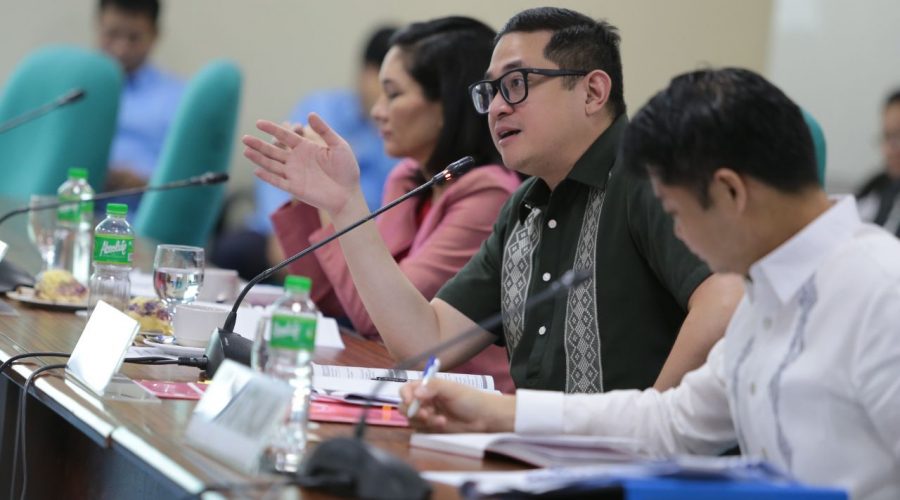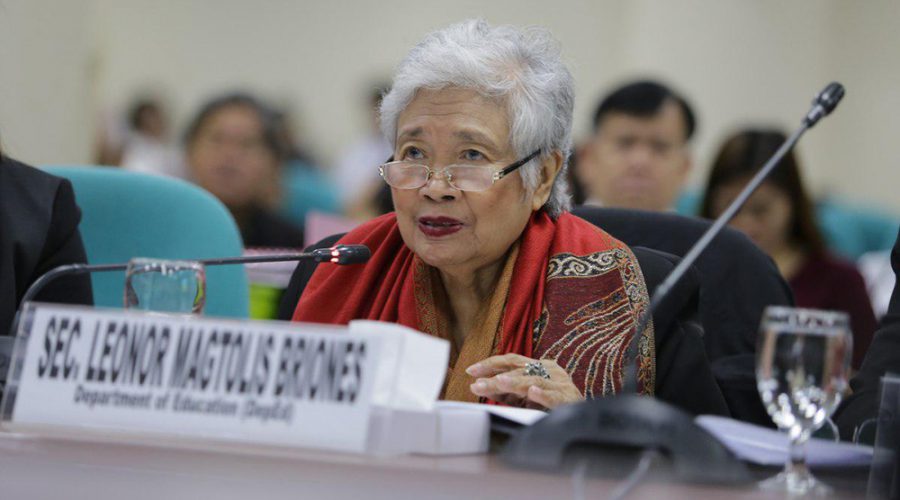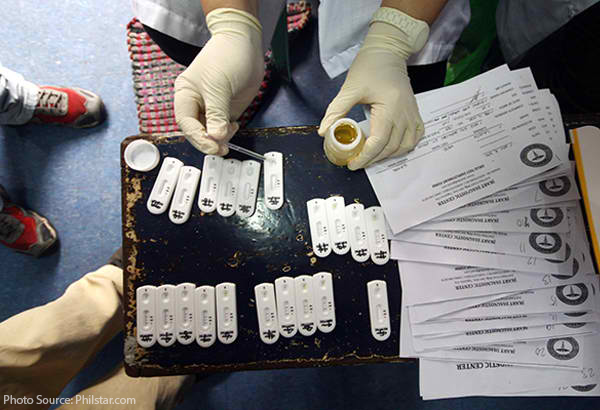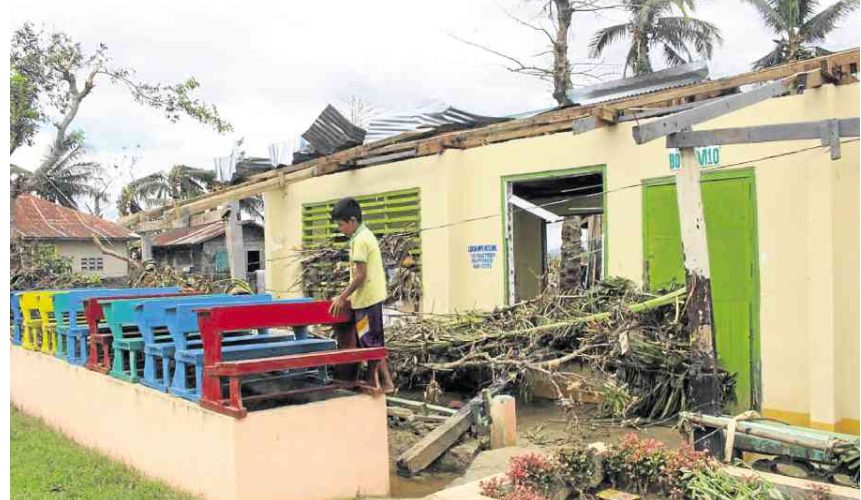department of Education
Bam: DepEd must catch up on underspending
Sen. Bam Aquino urged the Department of Education (DepEd) to address its underspending to speed up delivery of needed learning materials to millions of primary and secondary students in the country.
“The DepEd needs to be more efficient in its delivery, which can hamper the delivery of learning materials and other needs to our students,” said Sen. Bam, vice chairman of the Committee on Finance, during the hearing for the DepEd’s P613.1 billion budget for 2018.
“There is money budgeted but not spent. This means the Filipino people aren’t receiving all the learning materials and education services the government can provide,” Sen. Bam emphasized.
“For a student, it doesn’t matter if there is a lack of funds, or inefficiency in spending the funds, parehas lang yan sa kanya, wala pa rin ang mga libro at kagamitan,” he added.
Based on briefing materials submitted by DepEd to Sen Bam, the agency has completed only 3.65 percent obligation in relation to appropriation for learning resources such as textbooks, Science and Math equipment, computerization and library for 2017.
“Sayang naman ang mga kagamitan, gaya ng libro at iba pang materyales na mabibigay sana natin sa mga estudyante upang suportahan ang kanilang pag-aaral. That is almost 14 billion pesos worth of learning materials not delivered to our students and teachers,” said Sen. Bam.
Also, the DepEd only released 30 percent of its P109-billion budget for classrooms, leaving the agency with P76 billion unspent for the construction of around 15,000 classrooms in 2017.
Responding to Sen. Bam’s call, DepEd Sec. Briones vowed to catch up on their underspending and ensure their budget is maximized moving forward.
“We’ve been working to raise more money for education in the Philippines so let’s use the budget more efficiently and ensure we are investing as much as we can into the education of young Filipinos,” said Sen. Bam.
Bam to DepEd: No to student drug list!
Sponsorship Speech of Sen. Bam Aquino on Confirmation of Sec. Leonor Magtolis Briones as DepEd Secretary
Mr. President, majority floor leader, dear colleagues, magadang hapon.
I stand before this Chamber as the Chairperson of the CA Committee on Education, Culture and Sports to recommend the approval of the confirmation of Secretary Leonor “Liling” Briones of the Department of Education.
Mr. President, just this week, the Senate sent a strong signal to the Filipino people with an 18-0 vote for the passage of the Affordable Higher Education for All Act.
The message? As a country, we prioritize is education. The investment to educate our countrymen and arm them with the knowledge and skills to overcome poverty is the best investment we can make as a country.
So today, Mr. President, it is my distinct privilege to manifest support for an esteemed Filipina who can lead the charge to provide quality education for every Filipino.
Isa po siyang katangi-tanging lingkod bayan na kilala sa pagsulong ng de kalidad na edukasyon kasabay ng mabuti at maayos na pamamahala — she is no other than the incumbent Secretary of the Department of Education, Sec. Leonor Liling Briones.
Mr. President, our nominee has always exhibited excellence.
She graduated Magna Cum Laude in Business Administration major in Accountancy at Silliman University in 1958.
In 1967, she completed her Master’s Degree in Public Administration and was awarded Dean’s Lister for Local Government and Fiscal Administration in the University of the Philippines, Diliman campus.
In 1968, she completed her Diploma course with distinction in Development Administration with a major in Public Enterprises in Leeds University, England.
She also completed specialized studies in governance at Harvard University in 1984 and then again in 2004.
But, distinguished colleagues, Sec. Briones has extended her reach beyond academic excellence. She has also embraced her passion for public service.
She served as the Secretary of the Commission on Audit for 9 years, from 1978 to 1987.
In 1996, she became the Vice President for Finance and Administration of the University of the Philippines System for two years before serving as the Presidential Adviser for Social Development.
Then, in 2001, Sec. Briones served as the country’s Treasurer. And as we are all aware for the past months, she lent her expertise, talents, and skills as the incumbent Secretary of the Department of Education.
Mr. President, kaakibat ng kanyang paglingkod sa bayan ang kanyang pagmamahal sa edukasyon.
As a technocrat in public administration, she maintained her involvement in the academe.
For forty years, she served as a professor and a faculty member at the graduate level of her alma mater – the UP National College of Public Administration and Governance, which we all know as NCPAG.
And in March 2013, the board of Regents of the same University conferred to her the honorary title Professor Emeritus.
Not one to be confined – whether as a member of the academe or as a government official – Sec. Briones was also the Lead Convenor of Social Watch Philippines where she led a civil society campaign to increase the budget for social services, especially for education.
Mr. President, her service in various capacities, not to mention her consultancy engagements across sectors, has merited her numerous awards – perhaps too many to mention this afternoon.
What is evident is that Sec. Briones has made a lifelong commitment to exceptional public service. And we are fortunate to have her serve as a leader in our country’s pursuit of excellence in education.
Honored colleagues, based on the accomplishments alone, it is clear that Sec. Briones is qualified for this job.
And based on my personal experience working with her over the past 8 months, I can say that she truly is champion for education – one who can make our hopes and dreams for every Filipino student a reality.
And with that, Mr. President, dear colleagues, it is my distinct honor to endorse Sec. Leonor Liling Briones for the position, Secretary of the Department of Education.
Maraming salamat po, Mr. President!
Bam eyes quick repair, rehab of schools destroyed by typhoon
A senator has filed two resolutions seeking to determine the status of relief and rehabilitation of schools destroyed by Typhoon Nina in Regions IV-A, IV-B and V and post-disaster recovery in the Lawin-ravaged Cagayan province.
In Senate Resolution No. 266, Sen. Bam Aquino said 1,046 schools sustained infrastructure damage, 1,548 totally destroyed classrooms and 3,797 partially major damaged classrooms in Regions IV-A, IV-B and V.
“Thousands were affected due to the change in the schedule of classes caused by the devastation of the typhoon,” said Sen. Bam, adding that the disruption in classes will last for six months as estimated by the Department of Education (DepEd).
In addition, 63,232 units of school furniture, 386,689 learning resources and computers in 384 schools were destroyed by the typhoon, which wreaked havoc on Christmas Day.
“Preparedness and long-term solutions are needed to mitigate the effects of typhoons and natural hazards to students and learners,” said Sen. Bam, who also backed the DepEd’s call for the restoration of the P650-million Quick Response Fund (QRF).
According to Sen. Bam, some of the solutions include the early allotment of funds for cleanup and temporary learning services, buffer stock of furniture and computers and their prepositioning in disaster-prone areas.
Sen. Bam also submitted Senate Resolution No. 267 to ensure proper coordination between the National Disaster Risk Reduction and Management Council (NDRRMC), concerned local government units and private sector in the delivery of humanitarian aid to typhoon victims in Cagayan.
“This will lead to the recovery and the restoration of the livelihood, welfare and well-being of the affected families, particularly the children and the youth,” said Sen. Bam.
According to reports, typhoon Lawin destroyed P8.5 billion worth of agricultural products and infrastructure in Cagayan and left 15 people dead in the Cordillera Administrative Region (CAR) and Cagayan Valley.
Typhoon Lawin also displaced a total of 143,531 people or 28,710 families in Ilocos Region,Cagayan Valley, Central Luzon, CALABARZON and the Cordillera Administrative Region (CAR).
Bam on chikungunya outbreak
With the occurrence of chikungunya in different parts of the country, we call on all public school officials to strictly follow the Department of Education’s memorandum dated September 30, 2016 to protect our students by intensifying mosquito control efforts.
We commend DepEd Secretary Leonor Briones for her swift action in disseminating information about mosquito-borne diseases such as Zika, dengue and chikungunya to all public schools in the country.
Sa paraang ito, makakapaglatag tayo ng mga hakbang upang hindi makapasok ang mga sakit na ito sa ating mga paaralan.
Bam: ‘Historical revisionism’ of Martial Law slap in face of victims
Bam on Martial Law Education, Historical Revisionism
Transcript of media interview after the Senate hearing of the Committee on Education on Martial Law Education
Sen. Bam: Unang una, iyong mga textbook mismo may problema na. The textbook we showed earlier, although ito iyong nire-replace ng bagong curriculum, talagang walang nakalagay tungkol sa pagnakaw ng panahong iyon, walang nakalagay tungkol sa tens of thousands na kinulong, the thousands na pinatay.
We’re happy that DepEd is undergoing the change in curriculum at sabi nga nila, ipapakita nila ang mas complete picture. Palagay ko kasi, ang lumang textbook natin, ayaw ipakita iyong mga masamang nangyari sa ating bansa.
Maybe it’s human nature that we don’t want to face the ugliness of our history. Ngayon, Secretary Briones herself said na itong curriculum change, sisikapin nila na buo iyong picture, mas makikita ng mga kabataan natin iyong downside ng Martial Law, which of course, is the corruption and human rights abuses.
Palagay ko, kung andiyan ang pundasyon ng kaalaman [ng kabataan], mas madali nilang susuriin ang nakikita nila online.
Kung mayroon silang foundation of what is right, what is wrong, ano iyong nangyari, ano iyong hindi nangyari, pag online na sila ay mas may kakayahan silang suriin kung ano talaga iyong nangyari o hindi.
It starts with our educational system. Palagay ko doon talaga magsisimula.
Maganda rin na nasabi ni Sec. Briones na hindi lang itong parte ng ating kasaysayan ang kanilang ni-review. The whole history ni-review. One of the other senators mentioned about the human rights abuses of the Americans. We talked about human rights abuses in other administrations and of course, iyong panahon ng Martial Law.
Magandang pangitain ito na mayroong mga pagbabago tayong makikita at iyong mga textbook natin na kulang-kulang, sana talagang palitan natin at mabago na talaga siya.
Q: After 44 years, alarmed ka ba na nakakalimutan na ang Martial Law?
Sen. Bam: Hindi lang siya nakakalimutan, nababago iyong ating kasaysayan. Iyon iyong mas nakakabahala na tila sinasabi na ang panahon ng Martial Law, walag namatay, walang kinulong, walang tinorture.
In fact, the textbook that I read from noong unang part ng hearing, kung babasahin mo iyon, parang napakasaya ng panahon ng Martial Law.
Nakakahiya sa mga tao gaya ni Sec. Briones. Siya mismo Martial Law victim. Siya mismo nahirapan noong panahong iyon.
It’s a disservice and a slap in the face for those victims na parang kinakalimutan natin ang masamang nangyari noong panahon.
Sometimes, we just have to face the fact na may masamang nangyari sa ating kasaysayan. Kung kinakalimutan natin iyan, we’re bound to repeat the same mistakes.
Q: Sabi ni Sec. Briones, the transition takes time. How soon you want to see the changes?
Sen. Bam: Technically itong curriculum change, 2013 pa ito. Ongoing pa iyong transition. This year, because of the transition, hindi maituturo gamit ang textbook ang Martial Law sa ating mga estudyante. It won’t be taught because it belongs in the old Grade 6 curriculum. Dahil may transition, hindi talaga siya maituturo this year.
Sa ibang mga eskuwelahan, iyong mga teachers ang nagkukusa na maglabas ng sariling learning materials. In fairness to those teachers, they’re doing their best to teach about it but with all of these transitions that are happening, may mga pagkukulang na kailangang punuan.
Alam naman iyan ng DepEd but we’re hoping that in the years to come, itong curriculum na mas kumpleto, mas naipapakita iyong masasamang nangyari din, iyon iyong gamitin sa ating mga eskuwelahan.
Q: Hindi po ba kayo naa-alarm sa efforts online to revise history, lalo na pagdating sa Martial Law?
Sen. Bam: That’s one of the reasons why na siniguro natin na mayroon tayong hearing about Martial Law education. May efforts online pero kung iyong mga eskuwelahan, kumpleto naman iyong tinuturo tungkol sa Martial Law, iyon ang talagang panlaban natin diyan. The NHCP, si chairperson Diokno herself said, historical fact na ang mga bagay-bagay na ito. Hindi na ito disputable. We have laws already talking about the atrocities of Martial Law. Natatakot ba tayo o nahihiya na pag-usapan ang masasamang bagay sa ating kasaysayan? Palagay ko, kailangan nating harapin iyan so we won’t repeat the mistakes of the past at iyong ating bayan din, makita natin na buo ang ating kasaysayan. Wala tayong kinakalimutan na mga bagay bagay.
Q: May efforts iyong online groups to make people aware na medyo niloko daw sila. Iyong mga tinuro sa kanila, like the Aquino family, change history in their favor…
Sen. Bam: Alam mo. Sabihin mo iyan sa mukha ng mga Martial Law victims. Tell it to them. Tell it straight to their face na hindi sila na-torture, hindi sila kinulong, hindi namatay iyong mga taong namatay, namatayan. Sila mismo. The list is quite long. Sabi nga ni Sec. Briones, baka hindi lang iyan 70,000. Baka more than 70,000 pa iyan because hindi pa nailalagay iyong mga victims in the Visayas and Mindanao. We owe it to them to be able to talk about these atrocities.
Q: Nabanggit po sa hearing sa Germany mayroong law to make sure na magtuturo ng holocaust…
Sen. Bam: Mayroon na tayong batas niyan. Iyon iyong isang bagay na ni-raise ko during the hearing. Our Martial Law Victim Reparation Act of 2013, Section 27, nakalagay doon na kinakailangan na iyong ating CHED at DepEd, pag-usapan iyong mga nangyari noong Martial Law, the atrocities para hindi na ito maulit uli.
It’s already in our laws, kailangan lang talaga itong i-implement nang maayos.
Senate Bill No. 672: Peace Education Act
Conflict is one of the biggest hindrances to achieving national unity and economic development and, sadly, the Philippines is not exempt from problems of ethnic conflict, amongst a host of other types of conflict.
Media coverage, with catchy headlines and limited word counts, can often further narrow public understanding of complex issues that surround conflict leading to a greater gap between different groups in Philippine society.
In a global environment where extremism threatens our democratic ideals, it is imperative for our nation to introduce Peace as an integral part of our school curriculum. By doing so, we can ensure that our youth and future generations are in a better position to unite, founded on a solid understanding of our multicultural nation.
This bill seeks to introduce Peace Education in the school curriculum at all levels, in both public and private educational institutions. Under the Department of Education (DepEd) and the Commission on Higher Education (CHED), a Peace Education Advisory Council would be formed whose mandate would be to formulate the syllabus, learning materials and facilitate teacher-training and evaluation of the Peace Education program.
By introducing topics such as religious pluralism, gender and sexuality, cultural diversity, and conflict management into classroom discussions, we may begin to develop our youth’s openness to meaningful expressions of diversity. In creating this conversation within a safe and moderated school environment, we can bridge together the many different ideas that, left unexplored, threaten to pull our nation apart.
Conflict has great economic and social costs, and most importantly, leads to many human casualties. To achieve prosperity as a nation, we must take the necessary steps in uniting our diverse population through formal education on Peace.
in view of the foregoing, the passing of this bill is earnestly sought.
Senate Bill No. 705: Scholarship for the Poor Act
Rusty Quintana grew up as a street child in Cagayan De Oro, and was unable to finish elementary and high school, instead finishing his basic education through the Alternative Learning System (ALS) Program of the Department of Education. Through his hard work, perseverance and talents. Rusty obtained a scholarship at the prestigious Xavier University and obtained his degree last year.
Rusty represents the many Filipino students who despite their talent, intelligence and determination, are unable to pursue higher education due to a lack of funds.
This bill proposes that all colleges and universities be mandated to provide scholarships to at least 5% of their total student population who are unable to afford secondary education but are deserving of the support.
In this way, post-secondary education in any institution can be made accessible to all students regardless of their financial situation.
By enacting this bill, our nation will uphold Article XIV, Section 1 of the Constitution which provides that the State “protect and promote the right of all citizens to quality education” and “take appropriate steps to make education accessible to all.”
This mandate will serve as an incentive for low-income families and students to strive for excellence in their studies, having a viable pathway to an excellent postsecondary education in any college institution. Filipinos across the nation will be empowered by this legislation which will ultimately serve as a key to rising out of poverty.
In view of the foregoing, the passage of this bill is earnestly sought.




Recent Comments